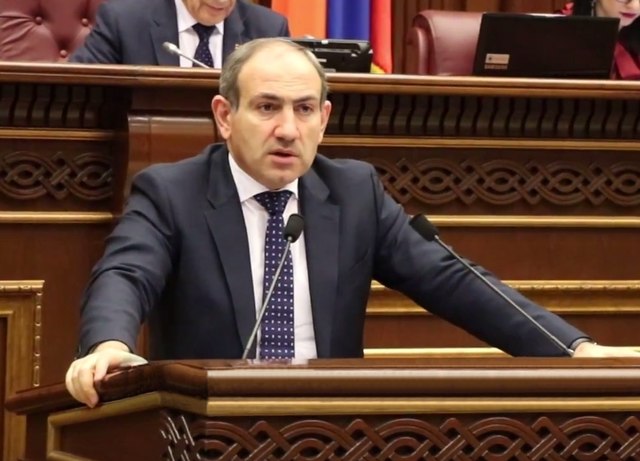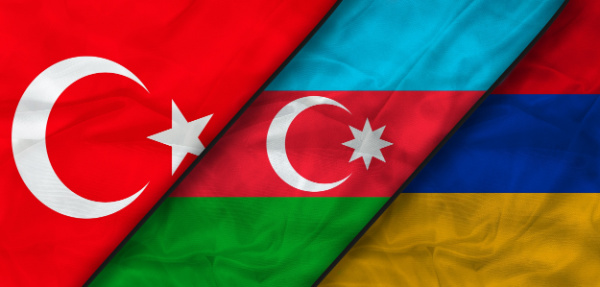Armenia and Turkey are close to Reaching Full Rapprochement
By Emil Avdaliani
Armenia and Turkey are itching closer to full restoration of bilateral relations. While the normalization process remains vulnerable to external pressures and domestic political constraints, the factors driving the engagement today are structural, and both parties clearly recognize the benefits of full restoration. However, this outcome will nonetheless require strong political leadership and a shift in domestic public opinion in both countries – none of which are guaranteed. The most likely outcome is a pattern of managed normalization, slow, cautious, and transactional. Under this model, Turkey and Armenia would gradually deepen technical cooperation, possibly culminating in consular-level relations and partial border reopening, particularly for commercial traffic.

Photo source: iravaban.net
BACKGROUND: In an unprecedented move, Armenian Prime Minister Nikol Pashinyan recently argued that for the Armenian government the “international recognition of the Armenian Genocide” is no longer among its foreign policy objectives. Diplomatic engagement between the two neighbors, though modest in scale, has gained institutional shape over the past four years. Since late 2021, Turkey and Armenia have maintained a formal channel of communication through designated special envoys—Serdar Kılıç for Turkey and Ruben Rubinyan for Armenia—tasked with exploring avenues for normalization. Even though the dialogue has remained low-profile, the efforts have yielded tangible outcomes. Direct charter flights between Yerevan and Istanbul resumed in 2022 and both sides have agreed on the need to improve cargo transportation, even if full land border opening has not yet occurred. While diplomatic recognition has yet to materialize, the process is no longer as far-fetched as before.Armenia looks to diversify its foreign policy away from its traditional dependence on Russia. Ever since the breakup of the Soviet Union, Yerevan has been exclusively linked to Moscow for provision of security and through close commercial ties. But the defeat in the war against Azerbaijan in 2020 and the subsequent complete loss of the Nagorno-Karabakh enclave in September 2023 pushed Yerevan to reconsider its foreign policy, and to seek diversification. This involved a certain distancing from Russia and engagement with other global actors, the EU, the United States, India and surprisingly also Turkey. Armenia’s calculus is clear. By achieving a meaningful improvement of relations with Ankara, Yerevan wants to limit pressure emanating from Azerbaijan. Given the strategic nature of the relations between Ankara and Baku, Yerevan hopes that a friendly Turkey will serve as a certain disincentive for Azerbaijan to push against Armenia.
Improved ties with Turkey would also be economically beneficial for Armenia. Since the 1990s, Armenia has had only a limited connection with the outside world. Closed borders with Turkey and Azerbaijan left Armenia with only Georgian and Iranian ones open for trade. This north-south connectivity has hampered Armenia’s development of its commercial and industrial potential. An open border with Turkey would allow Armenian products to reach the large Turkish, and potentially the European market.
Meanwhile, there is also a growing willingness in Turkey to improve relations with Armenia. While Armenia is hardly of paramount importance for Turkey in economic terms, better ties with Yerevan would nonetheless enhance Ankara’s position in the South Caucasus, adding leverage in Turkey’s competition with Russia. Moreover, normalization with Armenia could offer Turkey the coveted land connection with Azerbaijan. The transit route through Georgia is well-developed but is still far longer than the one through Armenia’s southernmost province of Syunik, which separates Azerbaijan proper from its autonomous region of Nakhchivan. The route through Armenia would provide Turkey with a much shorter link to Azerbaijan. Improved ties with Yerevan would allow Ankara to achieve this goal diplomatically.
Russia -- although Turkey’s rival in the South Caucasus – nonetheless agrees with Baku’s and Ankara’s vision of the corridor through the Syunik province. Obviously, Russia has its own interests, such as the operation of the corridor under the oversight of its troops, and Yerevan disagrees with Moscow, which adds another layer to the tensions in Russian-Armenian relations. The corridor would allow Russia and Turkey to have a long circuitous railway connection via Azerbaijan.
IMPLICATIONS: The normalization with Armenia opens new avenues for regional connectivity. Turkish policymakers view the South Caucasus as a gateway to Central Asia, the Caspian region, and potentially China via the Middle Corridor—a logistics and trade route that bypasses Russia and Iran. In this context, improved relations with Armenia could facilitate the development of multimodal transport infrastructure and integrate it further into EU-Asia connectivity.
The reopening of the Turkish-Armenian border would not only benefit Armenia’s trade and connectivity with the broader region, but would also offer Turkish businesses access to new markets in Armenia and potentially further into the Eurasian Economic Union (EAEU). As a member of Russia-led EAEU, Armenia would enable eastern Turkish provinces like Kars and Iğdır to benefit from cross-border trade, transit infrastructure, and logistics services.
While Turkey has announced its readiness to finalize the improvement of relations with Armenia, it has also signaled that Yerevan will first have to conclude a peace treaty with Azerbaijan. Recent statements do indeed suggest that the two countries are close to signing a peace agreement. Baku and Yerevan have confirmed that the work on the document has been concluded and that the two sides are closer than ever to reaching a historic agreement. However, there are still disagreements about the corridor through Armenia and the Armenian constitution, which calls for unification with Nagorno-Karabakh.
Nevertheless, Baku and Yerevan have taken major steps to toward the peace agreement which in turn would open the door to Turkey to pursue bilateral engagement with Yerevan without prejudicing its strategic relationship with its ally Azerbaijan. Arguably, once a peace deal has been reached between Armenia and Azerbaijan, the efforts to reopen the Armenia-Turkey border and restore diplomatic ties will be accelerated.
Yet political, psychological, and logistical barriers will still have to be overcome. While Baku has officially refrained from opposing the Turkey-Armenia talks, it maintains significant leverage over the process. Turkish policymakers are traditionally sensitive to Azerbaijani perceptions and have repeatedly stated that normalization with Armenia will not come at the expense of their ties with Baku. This creates a structural ceiling for Turkish diplomatic engagement, one that is unlikely to be breached unless Armenia and Azerbaijan reach a final peace settlement that clarifies the status of the Zangezur Corridor and other contentious issues.
Domestic political dynamics in both Turkey and Armenia further complicate the picture. In both capitals, members of the political elites continue to harbor skepticism toward bilateral engagement. In Yerevan in particular, Prime Minister Nikol Pashinyan faces domestic constraints. While he has demonstrated willingness to explore normalization, his domestic political opposition accuses him of capitulation to Turkey and Azerbaijan, particularly in the wake of the loss of Nagorno-Karabakh.
Deficient infrastructure poses an additional challenge. Even if the two sides agree to reopen borders or launch joint trade initiatives, new physical infrastructure will be necessary to facilitate such interaction. Decades of closed borders have resulted in minimal customs cooperation, and underdeveloped trade logistics. Reviving these systems is going to require significant investment, time, and coordinated planning.
CONCLUSIONS: The emerging dialogue between Turkey and Armenia is not the result of spontaneous goodwill, but rather of shifts in the regional power balance coupled with economic imperatives. In comparison with previous attempts to improve relations, this time practical steps have been made, aided by geopolitical situation in the region. Over the next months, several plausible scenarios could emerge. The most likely outcome is a pattern of managed normalization—slow, cautious, and transactional. Under this model, Turkey and Armenia would gradually deepen technical cooperation, possibly culminating in consular-level relations and partial border reopening, particularly for commercial traffic. This would allow both governments to claim progress without provoking political backlash or over-committing to full diplomatic recognition. Such a path could potentially be underpinned by parallel Armenian-Azerbaijani negotiations or even formats which would include other regional actors.
A more optimistic scenario would involve a formal diplomatic breakthrough following a peace agreement between Armenia and Azerbaijan. This would remove the principal strategic obstacle from Turkey’s calculus and could lead to the exchange of ambassadors, the full reopening of land borders, and large-scale investment in regional infrastructure. In this context, Turkey could position itself as an economic gateway for Armenia helping it to break its isolation and attract diversified foreign capital.
Overall, the geopolitical situation in the South Caucasus is favorable to a definitive improvement of Armenian-Turkish relations and the two parties clearly recognize the benefits of full restoration. However, this outcome will nonetheless require strong political leadership and a shift in domestic public opinion in both countries – none of which are guaranteed.
AUTHOR BIO: Emil Avdaliani is a professor of international relations at the European University in Tbilisi, Georgia, and a scholar of Silk Roads. He can be reached on Twitter/X at @emilavdaliani.
Peace with Armenia Will Further Pan-Turkic Ambitions
By Barçın Yinanç
November 9, 2023
A peace settlement in the Caucasus provides a huge window of opportunity for the realization of the Middle Corridor. Turkey needs to strike the right balance in its relations with Armenia and Azerbaijan while neutralizing the disruptive influence of Iran and Russia. Turkey, whose military backing has been decisive in Azerbaijan’s victories in Nagorno-Karabakh, needs to convince its close ally that it’s in their common interest that Armenia is rewarded for its policies, and that inaction could prove costly for regional peace and pan-Turkic ambitions.

Turkey-Azerbaijan Summit Consummates Reconciliation
By Richard Weitz (vol. 5, no. 18 of the Turkey Analyst)
Turkish-Azerbaijani relations have been on the rebound in recent months since the Turkish-Armenian reconciliation effort, launched in 2008, has effectively collapsed over differences regarding the Armenian-occupied territories of Azerbaijan and the disputed region of Nagorno-Karabakh. The summit earlier this month between the two governments will accelerate this process, especially by helping them develop their energy partnership.
Lessons from the Turkish-Armenian Protocols
By Joris Gjata (vol. 3, no. 7 of the Turkey Analyst)
The Turkish-Armenian reconciliation process, formalized with the signing of two Protocols on October 10, 2009, does not seem to be going anywhere. The failure to materialize the promises of opening the border and establishing diplomatic relations has complex reasons and crucial implications. There are important lessons to be drawn from the mistakes in this process not only for the Western political leaders but most importantly for Turkish and Armenian foreign policy makers.
Implications of the Failed Turkish-Armenian Normalization Process
By Svante E. Cornell (vol. 3, no. 5 of the Turkey Analyst)
In spite of great hopes and much foreign pressure, the Turkish-Armenian reconciliation process can be said to have failed to bring about its intended result. Under current circumstances, the likelihood of the ratification of the Protocols signed in August 2009 is close to nil, barring some major turn of events. It is therefore time to reflect on the reasons that the process failed; and the implications for Turkey and the wider region. The process itself is in fact illustrative of the erroneous assumptions that Western political leaders appear to have harbored about regional realities.


